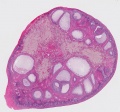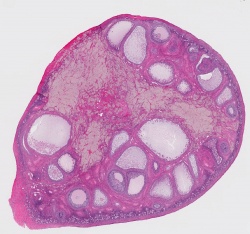Ovarian Cysts
Ovarian cysts are sacs filled with fluid that can form both on the outer surface of the ovaries or inside the ovaries. They are commonly benign and asymptomatic yet can become a problem if they rupture or result in bleeding and pain.
|
Ovarian Cysts | |
| Causes | Smoking, Environmental Toxins, Prescription Medications |
|---|---|
| See Also | Women's Health, Polycystic Ovary Disease, Dysmenorrhea, Infertility (Female), Obesity, Hypothyroidism |
| Books | Books on Women's Health |
| Articles | Articles on Women's Health |
Naturopathic Assessment
Causal Factors
In order to stimulate the innate ability of the body to heal the causes of disease must be identified and addressed. With ovarian cysts the causes are variable and include lifestyle and environmental factors. A detailed assessment is required to determine which factors are contributing to ovarian cysts.
Lifestyle
- Foods that are high in added hormones, such as dairy and chicken may play a role.
Environmental
- Environmental toxins are associated with increased risk of ovarian cysts.[2]
Physiology
- Early menstruation
- Early menstruation (11 years or younger) increases the risk of ovarian cysts.
Medical Interventions
- Prescription Medications
| Article | CYP2D6 and Tamoxifen, NDNR 2011 February |
|---|
- Taking Tamoxifen (Soltamox) therapy for breast cancer increases the risk of ovarian cysts.
- Oral contraceptive/birth control pill use decreases the risk of developing ovarian cysts because they prevent the ovaries from producing eggs during ovulation.
Diagnostic Testing
The diagnosis of ovarian cysts is done following a detailed medical history and physical exam. To definitively diagnose them you require a pelvic ultrasound.
- Blood tests to assess hormone levels are typically done as well to determine other underlying conditions.
Related Symptoms and Conditions
Ovarian Cysts are associated with other conditions such as:
- Endometriosis
- Polycystic Ovary Disease
- Dysmenorrhea
- Infertility
- Irregular menstrual cycles
- Increased upper body fat distribution
- Hypothyroidism
- Ovarian cysts are typically only associated with increased risk of cancer if they continue to occur in a woman who is menopausal.
Characteristics
There are several different types of cysts.
- A common type, called functional cysts can form commonly during the menstrual cycle. Each month, an egg develops in a follicle on the ovary and is released (ovulation). However if the follicle fails to break open and release the egg, the fluid may stay within the follicle and form what's called a follicular cyst.
- Similarly, a cyst can form after the egg has been released, called a corpus luteum cyst. These types of cysts are not uncommon during the reproductive year, are benign, and typically resolve without treatment.
- Other types of cysts include endometriomas and dermoid cysts
Common Symptoms
Ovarian cysts are often asymptomatic yet they can present with:
- This type of pain is more likely if the cyst is large, breaks open, bleeds, is twisted or causes twisting of the fallopian tube or ovary on its blood supply
- Some other commonly experienced symptoms include:
- Bloating in the abdomen
- Pain during bowel movements, around the menstrual cycle, with movement, with intercourse
- Constant, dull aching pain
- Abnormal bleeding
- Nausea or vomiting
Naturopathic Treatment
The goal of naturopathic treatment is to support and work in tandem with the healing power of the body and to address the causal factors of disease with individual treatment strategies. Ovarian cysts often go away without treatment. The following treatment recommendations can assist with the acute symptoms of a ruptured cysts or when ovarian cysts tend to be chronic or reoccurring.
It is always advisable to work with a naturopathic doctor before engaging in any treatment plan.
Home Care
Home Care strategies include:
- Apply ice packs or hot water bottles to minimize pain.
Lifestyle
Lifestyle recommendations include:
- Avoid food sensitivities especially during the time of ovulation and prior to menstruating.
- Eliminate alcohol, caffeine, saturated fats and sugar.
- Consume a diet that focuses on whole unprocessed foods (whole grains, legumes, vegetables, fruits, nuts and seeds).
- Choose organic hormone-free foods, especially dairy and meat.
- Focus on increasing fiber in the diet.
- Increase consumption of soy foods and ground flaxseed.
- Ensure you drink adequate water.
Naturopathic Therapies
The prescribing of naturopathic therapies requires the guidance of a naturopathic doctor as it depends on a number of factors including the causal factors, a person's age, prescription medications, other conditions and symptoms and overall health. It is always advisable to work with a naturopathic doctor prior to taking any natural therapies.
- Herbs such as Wild yam (Dioscorea villosa) can be recommended for uterine pain.[3]
- Gemmotherapies such as Buxus sempervirens
- Homeopathy can be helpful in chronic recurring ovarian cysts.
References
Reviewed by Iva Lloyd, BScH, RPE, ND [1]
- ↑ Holt VL, Cushing-Haugen KL, Daling JR (2005 Mar) Risk of functional ovarian cyst: effects of smoking and marijuana use according to body mass index Am J Epidemiol;Vol161(6):520-5. PMID: 15746468.
- ↑ Nilsson E, Larsen G, Manikkam M, Guerrero-Bosagna C, Savenkova MI, Skinner MK (2012) Environmentally induced epigenetic transgenerational inheritance of ovarian disease. PLoS One;;7(5):e36129. PMID: 22570695.
- ↑ Hoffman D (2003) Medical Herbalism: The Science Principles and Practices Of Herbal Medicine. Healing Arts Press.

